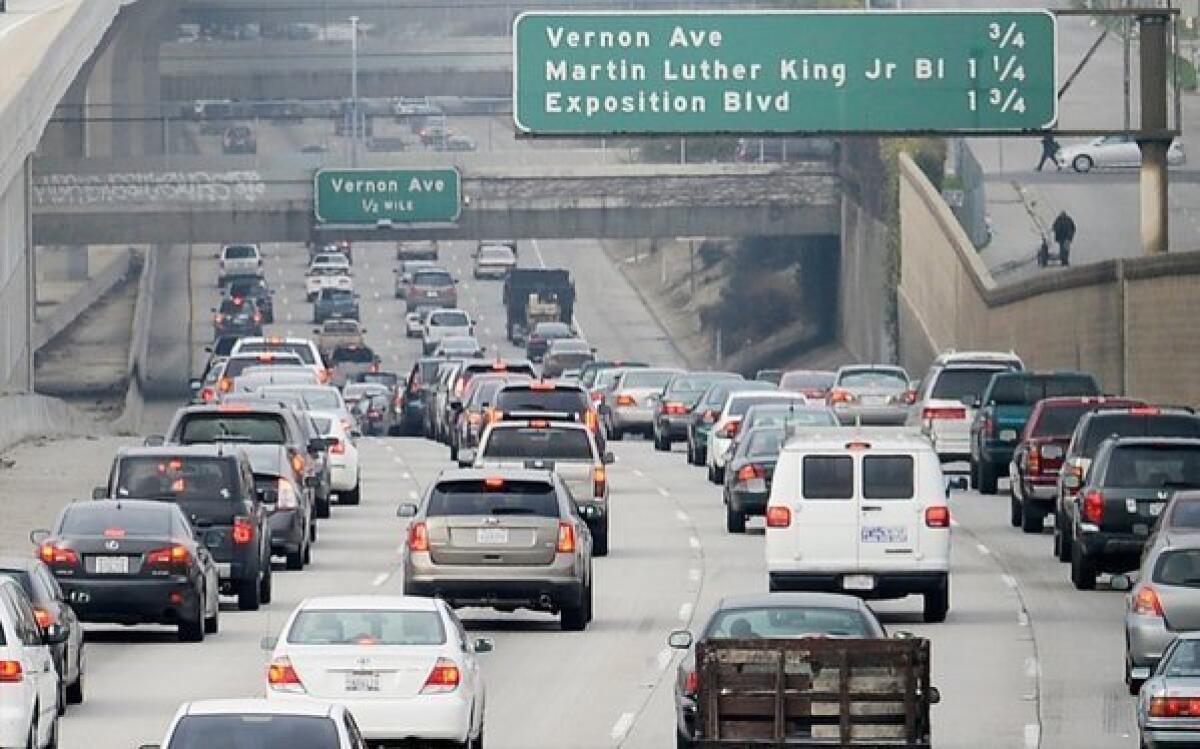Editorial: Enjoying the clean air? Trump weakens car emissions standards just when we need them the most

- Share via
Walk outside, look at the sky and take a deep breath. The air right now across much of Southern California, the country, and even the world is sparklingly clear and clean compared with just a few weeks ago. The change is especially noticeable in cities that are normally choked by vehicle exhaust, like Los Angeles. What’s more, it’s not just the smog, but also the greenhouse gas emissions fueling global climate change that have decreased with the temporary slowdown in burning fossil fuels.
The reason, of course, is that driving, flying, travel of almost all sorts and the economy in general have ground to a near halt in an attempt to slow the spread of the novel coronavirus. But it shouldn’t take a pandemic to show people what a future with clean air, blue skies and a healthy planet could look like. This could be a sustainable reality if countries committed to clean industries, clean energy and, especially, clean vehicles.
So, it’s especially galling that the Trump administration chose this very moment to roll back the United States’ most important program to cut automobile pollution and fight climate change. On Tuesday, the U.S. Environmental Protection Agency and the Department of Transportation released new rules relaxing Obama-era fuel efficiency standards for passenger cars and light trucks.
The rule significantly weakens the standards adopted in 2012 as part of the federal government’s bailout of the financially troubled auto industry. The original standards called for automakers to increase fuel economy across their fleets by about 5% per year, reaching an average of 54 mpg by 2025. Automakers were expected to meet the target by developing more hybrid and electric models, gradually cutting smoggy tailpipe pollution and greenhouse gas emissions in the process.
The new Trump rule, however, would require automakers to increase fuel economy by only 1.5% a year, reaching an average of 40 miles per gallon by 2026. That’s so low that the auto industry is likely to exceed it voluntarily.
The Trump administration argues that the new rule is simply a response to consumer demand for SUVs and pickup trucks, which guzzle gas at a higher rate than many other vehicles. But that’s no justification. The role of the federal government is not to blindly follow the market off a cliff; in the era of climate change, the government must set policies and adopt regulations that push industries to develop products that are better, safer and healthier for the planet. In fact, existing laws approved by Congress have directed the federal government to set transportation and environmental rules that conserve energy, maximize fuel economy, clean the air and reduce greenhouse gas emissions. The clean-car standard rollback moves us in the opposite direction.
Fortunately, environmental groups, public health advocates and states, including California, are expected to sue to block and, hopefully, overturn the Trump administration’s rollback. It’s just a shame that the U.S. will lose precious time fighting in court rather than using American ingenuity and talent to build the next generation of clean cars. We could get to permanently blue skies and a healthier planet sooner.
More to Read
A cure for the common opinion
Get thought-provoking perspectives with our weekly newsletter.
You may occasionally receive promotional content from the Los Angeles Times.










